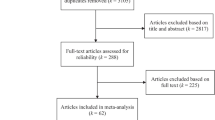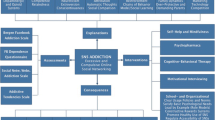Abstract
We examine the relationship between proximity to electronic gambling machines or casino table games within gambling venues and the risk of being a person who experiences gambling problems among participants in a Massachusetts high-risk sample cohort study. The analysis employs data from Wave 2 through Wave 5 of the Massachusetts Gambling Impact Cohort (MAGIC) study conducted from 2015 to 2019. The Problem and Pathological Gambling Measure (PPGM) was employed to categorize participants as non-gamblers, recreational gamblers, at-risk gamblers, or problem/pathological gamblers. No significant relationship was found between the type of gambler and either table game or electronic gambling machine distance or density for either the wave prior to casino introduction or any of the waves subsequent to casino introduction. Results suggest that the Massachusetts population may be desensitized to some of the potential negative effects of casino proximity due to long-term exposure to casinos in neighboring jurisdictions.





Similar content being viewed by others
Data Availability
Data from the MAGIC study is available by request through the Massachusetts Gaming Commission’s data repository, MODE (https://massgaming.com/about/research-agenda/#access).
Code Availability
Not applicable.
References
Abbott, M. (2005). Disabling the public interest: Gambling strategies and policies for Britain: a comment on Orford 2005. Addiction, 100(9), 1233–1235; discussion 1235. https://doi.org/10.1111/j.1360-0443.2005.01198.x
Abbott, M. (2006). Do EGMs and problem gambling go together like a horse and carriage? Gambl Res, 18(1), 7–38.
Abbott, M., & Volberg, R. (1999). Gambling and problem gambling in the community: An international overview and critique. https://www.dia.govt.nz/Pubforms.nsf/URL/report1.pdf/$file/report1.pdf. Accessed 16 July 2020
Abbott, M., Williams, M., & Volberg, R. A. (1999). Seven years on: A follow-up study of frequent and problem gamblers living in the community. https://www.dia.govt.nz/pubforms.nsf/URL/report2.pdf/$file/report2.pdf. Accessed 4 June 2020
Abbott, M., Volberg, R., Bellringer, M., & Reith, G. (2004). A review of research on aspects of problem gambling. summary, conclusions and recommendations. https://niphmhr.aut.ac.nz/__data/assets/pdf_file/0004/7537/summary_of_auckland_report.pdf. Accessed 26 June 2020
Christensen, D. R., Williams, R. J., & Ofori Dei, S. M. (2019). The multidimensional structure of problem gambling: An evaluation of four gambling categorization instruments for an international online survey of gamblers. Journal of Gambling Studies, 35(4), 1079–1108.
Etuk, R., Shirk, S. D., Grubbs, J., & Kraus, S. W. (2020). Gambling problems in US military veterans. Current Addiction Reports, 7(2), 210–228.
Fenich, G. G. (1996). A Chronology of (Legal) Gaming in the U.S. Gaming Research & Review Journal, 3(2), 65–78.
Freeman, J. R., Volberg, R. A., & Zorn, M. (2020). Correlates of at-risk and problem gambling among veterans in Massachusetts. Journal of Gambling Studies, 36(1), 69–83. https://doi.org/10.1007/s10899-018-9814-7
Gerstein, D., Hoffman, J. H., Larison, C., Engelmann, L., Murphy, S., Palmer, A., Curchro, L., Toce, M., Johnson, R., Buie, T., Hill, M. A., Volberg, R., Harwood, H., Tucker, A., Christiansen, E., Cummings, W., & Sinclair, S. (1999). Gambling impact and behavior study: Report to the National Gambling Impact Study Commission. https://www.norc.org/PDFs/publications/GIBSFinalReportApril1999.pdf. Accessed 24 Nov 2018
Jacques, C., & Ladouceur, R. (2006). A prospective study of the impact of opening a casino on gambling behaviours: 2- and 4-year follow-ups. Canadian Journal of Psychiatry, 51(12), 764–773. https://doi.org/10.1177/070674370605101206
Jacques, C., Ladouceur, R., & Ferland, F. (2000). Impact of availability on gambling: A longitudinal study. Canadian Journal of Psychiatry, 45(9), 810–815. https://doi.org/10.1177/070674370004500904
Kahle, D., & Wickham, H. ggmap: Spatial Visualization with ggplot2. The R Journal, 5(1), 144–161. http://journal.r-project.org/archive/2013-1/kahle-wickham.pdf. Accessed 26 July 2020
LaPlante, D. A., Gray, H. M., Williams, P. M., & Nelson, S. E. (2018). An empirical review of gambling expansion and gambling-related harm. Sucht-Zeitschrift Fur Wissenschaft Und Praxis, 64(5–6), 295–306. https://doi.org/10.1024/0939-5911/a000563
LaPlante, D. A., & Shaffer, H. J. (2007). Understanding the influence of gambling opportunities: Expanding exposure models to include adaptation. American Journal of Orthopsychiatry, 77(4), 616–623. https://doi.org/10.1037/0002-9432.77.4.616
Pearce, J., Mason, K., Hiscock, R., & Day, P. (2008). A national study of neighbourhood access to gambling opportunities and individual gambling behaviour. Journal of Epidemiology and Community Health, 62(10), 862–868. https://doi.org/10.1136/jech.2007.068114
Raylu, N., & Oei, T. P. S. (2002). Pathological gambling: A comprehensive review. Clinical Psychology Review, 22(7), 1009–1061. https://doi.org/10.1016/S0272-7358(02)00101-0
Room, R. (2005). The wheel of fortune: Cycles and reactions in gambling policies. Addiction, 100(9), 1226–1227; discussion 1235. https://doi.org/10.1111/j.1360-0443.2005.01201.x
Room, R., Turner, N. E., & Ialomiteanu, A. (1999). Community effects of the opening of the Niagara casino. Addiction, 94(10), 1449–1466.
Rush, B., Veldhuizen, S., & Adlaf, E. (2007). Mapping the prevalence of problem gambling and its association with treatment accessibility and proximity to gambling venues. Journal of Gambling Issues(20), 193–215.
Sevigny, S., Ladouceur, R., Jacques, C., & Cantinotti, M. (2008). Links between casino proximity and gambling participation, expenditure, and pathology. Psychology of Addictive Behaviors, 22(2), 295–301. https://doi.org/10.1037/0893-164X.22.2.295
Shaffer, H. J. (2005). From disabling to enabling the public interest: Natural transitions from gambling exposure to adaptation and self-regulation. Addiction, 100(9), 1227–1230; discussion 1235. https://doi.org/10.1111/j.1360-0443.2005.01200.x
Shaffer, H. J., Hall, M. N., & Vander Bilt, J. (1997). Estimating the prevalence of disordered gambling behavior in the United States and Canada: A Meta-analysis. http://www.divisiononaddiction.org/html/publications/meta.pdf. Accessed 16 July 2020
Storer, J., Abbott, M., & Stubbs, J. (2009). Access or adaptation? A meta-analysis of surveys of problem gambling prevalence in Australia and New Zealand with respect to concentration of electronic gaming machines. International Gambling Studies, 9(3), 225–244.
Volberg, R., & Williams, R. J. (2014). Epidemiology: An international perspective. In D. C. S. Richard, A. Blaszczynski, & L. Nower (Eds.), The Wiley‐Blackwell Handbook of Disordered Gambling (pp. 26–48). John Wiley & Sons, Ltd. https://doi.org/10.1002/9781118316078.ch2
Welte, J. W., Wieczorek, W. F., Barnes, G. M., Tidwell, M. C., & Hoffman, J. H. (2004). The relationship of ecological and geographic factors to gambling behavior and pathology. Journal of Gambling Studies, 20(4), 405–423. https://doi.org/10.1007/s10899-004-4582-y
Welte, J. W., Barnes, G. M., Tidwell, M. O., Hoffman, J. H., & Wieczorek, W. F. (2016). The relationship between distance from gambling venues and gambling participation and problem gambling among US adults. Journal of Gambling Studies, 32(4), 1055–1063. https://doi.org/10.1007/s10899-015-9583-5
Williams, R. J., & Volberg, R. A. (2010). Best practices in the population assessment of problem gambling. Report prepared for the Ontario Problem Gambling Research Centre. http://opus.uleth.ca/handle/10133/1259
Williams, R. J., & Volberg, R. A. (2014). The classification accuracy of four problem gambling assessment instruments in population research. International Gambling Studies, 14(1), 15–28. https://doi.org/10.1080/14459795.2013.839731
Acknowledgements
The authors would like to acknowledge all the research assistants from the School of Public Health and Health Sciences at the University of Massachusetts Amherst who worked on various aspects of the MAGIC study over the years. Special thanks to Joshua Freeman, Heather Weaver, and Gabriela Vieyra who assisted with the development of this manuscript.
Funding
Financial support for the MAGIC study was provided by the Massachusetts Gaming Commission (MGC). The funding source in no way influenced the methodology, analyses, or interpretation of results presented in this manuscript.
Author information
Authors and Affiliations
Contributions
VE is the lead author of the manuscript. MZ was responsible for data management, data cleaning, and data analysis. RV and RW were primary investigators on the MAGIC study, proposed the manuscript topic, and assisted in drafting and editing the manuscript. All authors approved the final submission.
Corresponding author
Ethics declarations
Ethics Approval
The survey protocol was reviewed and approved by NORC at the University of Chicago’s Institutional Review Board and by the University of Massachusetts Amherst Institutional Review Board (reference number: 2015–2368).
Consent to Participate
Participants provided consent by voluntarily participating in the survey after agreeing to the confidentiality statement. Language included in the questionnaire stated: “The University of Massachusetts is conducting a longitudinal study about gambling in Massachusetts. This survey is private and confidential. We have a Federal Certificate of Confidentiality that is designed to protect the confidentiality of your research data from a court order or subpoena. We can provide you with more information if you would like. You don’t have to answer any question you don’t want to, and you can stop at any time. Almost everyone will be able to finish the survey within 15 to 20 min.”
Consent for Publication
Not applicable.
Conflict of Interest
VE and MZ declare no conflict of interest. RV and RW have no financial or non-financial conflicts of interest to declare during the past 3 years with the exception of a small grant/contract to RW from Unibet Ltd.
Informed Consent
“All procedures followed were in accordance with the ethical standards of the responsible committee on human experimentation (institutional and national) and with the Helsinki Declaration of 1975, as revised in 2000 (5). Informed consent was obtained from all [individuals] being included in the study.” Participants provided consent by voluntarily participating in the survey after agreeing to the confidentiality statement. Language included in the questionnaire stated: “The University of Massachusetts is conducting a longitudinal study about gambling in Massachusetts. This survey is private and confidential. We have a Federal Certificate of Confidentiality that is designed to protect the confidentiality of your research data from a court order or subpoena. We can provide you with more information if you would like. You don’t have to answer any question you don’t want to, and you can stop at any time. Almost everyone will be able to finish the survey within 15 to 20 minutes.”
Additional information
Publisher's Note
Springer Nature remains neutral with regard to jurisdictional claims in published maps and institutional affiliations.
Supplementary Information
Below is the link to the electronic supplementary material.
Rights and permissions
About this article
Cite this article
Evans, V., Zorn, M., Willliams, R. et al. Proximity to Casino Gambling Venues and Risk of Problem Gambling in Massachusetts. Int J Ment Health Addiction 22, 92–105 (2024). https://doi.org/10.1007/s11469-022-00861-7
Accepted:
Published:
Issue Date:
DOI: https://doi.org/10.1007/s11469-022-00861-7




